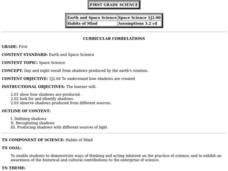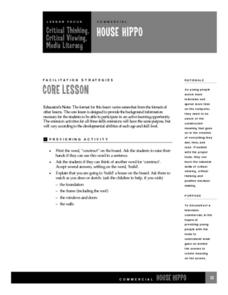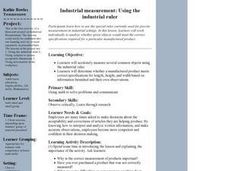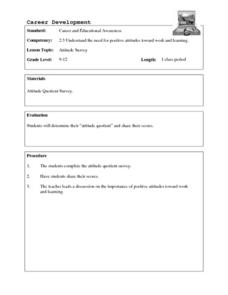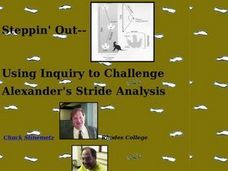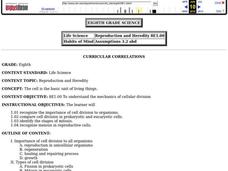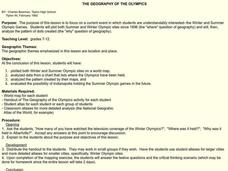Curated OER
Predicting: Making a Hypothesis
Learners analyze information from various sources to create a hypothesis about the origin of a family artifact. Students create a hypothesis about the origin of the item and write a paragraph explaining why they believe the hypothesis is...
Curated OER
"Wright-ing" Biographies for Young Readers
Students research the life of the Wright brothers or another famous person, write a draft biography, peer edit, make edits, and share the final biography with a younger reader. Lesson can be adapted for younger and older learners.
Curated OER
Day and Night
First graders study that day and night result from shadows produced by Earth's rotation. Students work to show how shadows are produced, look for and identify shadows and observe shadows produced from different sources.
Curated OER
House Hippo
Young scholars predict the purpose of a presented commercial. They discuss the challenges of making the hippo seem to be in living in the kitchen. In addition, they design a setting or background to create an illusion in their own pictures.
Curated OER
What it means to be a scientist and What is the Scientific Process?
Learners read an article and describe the scientific method. In this scientific process lesson, students compare basic science and applied science. Learners discuss ideas such as team work, application of an idea, how scientists...
Curated OER
Integration, the Skill that Binds
Tenth graders use mathematical concepts to help clarify their beliefs, effect solutions, and improve verbal skills. They use the steps common to the scientific methods as an aid in development of cognitive skills.
Curated OER
Group Rules and Expectations
Students experience how groups influence the behavior of their members through rules and expectations. They examine social groups in their lives which influence their behavior and expectations.
Curated OER
Industrial Measurement: Using the Industrial Ruler
Students accurately measure several common objects using the industrial ruler. They work individually to analyze whether given objects would meet the correct specifications required for a particular manufactured product.
Curated OER
Magnificent Metamorphosis
Students discover stages in metamorphosis through up close and real encounters with video, hands-on investigative and interactive activities using mealworms.
Curated OER
The Magic Hooey Stick
Students examine the use of a "magic hooey stick". They discover the concept of illusions and how science can reveal them. They answer discussion questions to end the lesson.
Curated OER
Career Development: Attitude Survey
Learners examine the importance of a positive attitude at work and in school. They complete an attitude quotient survey, and discuss the results and the importance of having a positive attitude toward work and learning.
Curated OER
Relationships, Day 3: Families
Students examine roles of family members and why families are important. They view magazine pictures and define family, describe their own families, draw a picture or diagram of their family, and pair pictures of family members to their...
Curated OER
The Civil War in Art and Literature
Students examine art related to the Civil War. They participate in activities that allow them to write poetry and drawings. They create their own journal and collect their work in a binder.
Curated OER
Pinwheels for Peace
Learners create their own pinwheels to celebrate World Peace Day. They follow directions carefully and discuss what peace means to them. They share their pinwheel with the class.
Curated OER
Journal of the Stars
Students receive balloons representing the "Life Cycle of the Stars." As the attached script is read, students follow the directions for the color of balloon they are given. Students chart the results for their star. They plot data from...
Curated OER
Why Do We Separate Power?
Students investigate the separation of powers that are outlined in the Constitution. The lesson includes essential questions that are used to guide the research. The information is used to increase knowledge of how power is used in...
Curated OER
INTRODUCTORY LESSON for the beginning of each new year
Learners study and express the five values of truth, love, peace, right conduct, and non-violence. The lesson plan focuses on the beginning of the year, introducing the values. Through games, singing, and reading--students become...
Curated OER
Color Scheme Design
Students create a work of art using specific color scheme guidelines studied previously. State standards for the arts are addressed in this six day lesson for the high school art class.
Curated OER
Antifreeze - Anti Fish
Students participate in the production of a play that highlights the direct linkage between storm drains and natural river, stream, or creek ecosystems. They explore their thoughts, feelings, and actions through dramatic interaction and...
Curated OER
Assessing Health Habits
Seventh graders discuss what are the characteristics of a personal with good health. They read an article about influences on health and discuss and perform a self assessment to gauge their personal health. They then go to the gym and...
Curated OER
Steppin' Out: Using Inquiry to Challente Alexander's Stride Analysis
Students distinguish between walking, jogging and running trackways in humans. They analyze the phylogenetic progression of the leg position as described by pace width and angulation, comparing amphibians, reptiles and mammals. Research...
Curated OER
Community Role Models in the Classroom: The Vietnam Era
Learners research information about the Viet Nam Era. They listen to a guest speaker talk about his/her role in the Viet Nam War. Students write articles for the classroom newsletter or other appropriate publication.
Curated OER
Reproduction and Heredity
Eighth graders study the importance of cell division, compare cell division in prokaryotic and eucaryotic cells, identify the stages of mitosis and recognize meiosis in reproductive cells.
Curated OER
The Geography of the Olympics
Learners plot the location of the Winter and Summer Olympics since 1896. Using the maps, they analyze data on where the Olympics have been held and discuss why that location was chosen. They discuss the possiblity of Indianapolis...




